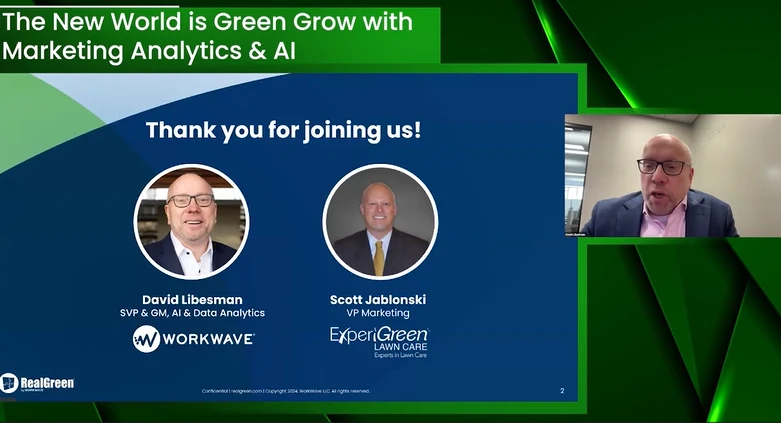It may hit you from the moment you sell. It might take six months down the road. But at some point, the personal aspect of selling your company – the one you likely spent years building up – is going to hit you.
Allen Sweeney was one of four panelists to tell Lawn & Landscape Business Builders Summit attendees that there’s a real emotional aspect to selling your company. Sweeney sold to private equity in 2022, and he advises anyone looking to sell to strongly consider how they’ll process that sale. Will it affect how you interact with your family, friends or colleagues?
Tom Heaviland, with Verde Property Services, remembers how surprisingly emotional the process was for him. It was a Friday morning at the start of November, and he was surrounded by attorneys and family members. When he heard, “Congratulations, Tom, you’re part of the BrightView family now,” it resonated with him. He had run the business with his dad for 13 years prior to his unexpected death.
“It was truly a family business,” Heaviland says. “You build this thing up, it’s your baby. You nurture it from infancy to adolescence to adulthood. You hand it over…and it’s not yours anymore. That hit me pretty hard.”
Of course, that’s not to suggest there are regrets. Not all sales are created the same way, but understanding the why of the sale is critical. Heaviland says the reasons can range from a business owner feeling like they’ve reached the ceiling of their opportunity to it being a seller’s market.
“Try to determine, ‘What’s motivating me at this time?’” Heaviland says.
KNOW YOUR WHY. Sweeney says he knew he wanted to offer his employees things he couldn’t do without private equity backing, and today, he’s writing bigger checks and has given away more than seven figures in additional money to his team.
“We wanted to create something in the landscape industry where we can make a big difference for people,” he says. “There’s life-changing moments that will continue to come for those people that are generational.”
J.T. Price, the CEO at Landscape Workshop, agrees that it’s important for an owner to know what problems they’re trying to solve. Are they trying to retire in a year, or are they hoping to run the business but need more private equity backing? Price says the companies looking to buy can’t answer those existential, more personal questions – only the owners and their families can do that.
“If you can’t have a boss, you need to be self-actualized with yourself,” he says. When Landscape Workshop has acquired companies, he’s seen owners do anything from leave entirely to adopting and becoming the platform. “You kind of meet the sellers where they are in terms of what they’re trying to achieve,” he adds.
Jeff Mullen, the director of M&A finance at Ruppert Landscape, agrees that owners should envision life beyond the sale.
“There’s a lot of value in staying on and operating post-transaction,” Mullen says. “And a great way to think through it is to just have conversations. Think about your time horizon.”
GETTING STARTED. Mullen’s on the other side of the table during M&A discussions, as he’s the one navigating acquisitions. His goal is to help companies understand the process and comes to a handshake deal before the letter of intent to help establish the framework for a potential partnership.
“Our role as potential buyers for these companies is, we want to be as understanding as we possibly can,” Mullen says. “My role is to limit surprises.”
Price recommends lining up an M&A lawyer before even testing the market. While folks like Mullen help landscapers digest the process, it’s important to have another set of eyes on fundamental deal terms and non-competes, which Price adds are getting really hairy. Landscape Workshop has seen two or three deals of their 30 result in mid-level employees leaving and stealing clients.
Knowing key terminology like “platform” or “strategic” is also vital. Mullen says becoming part of a platform means you’re still fully in charge, but you need to report to your partners now. Joining a strategic means you’re responsible for a region. Either way, back-office burdens like payroll and hiring responsibilities are lightened, but you’re still tasked with driving the business.
“Our partners are responsible for managing the customers and managing the service,” he says.
Sweeney says that not every business – and not every owner – is meant to be a platform. Knowing how it works and what it means for you is vital before signing any letters of intent.
“I think when people think about the acquisition side, they don’t understand the language that’s being spoken,” he says. He encourages sellers to ask potential partner questions to see what life may look like once the deal’s done. Aligning with missions and personalities that fit your own is key. “You’re going to ask yourself,” he says, “’What does that look like post-close?’”
Heaviland also suggests surrounding yourself with good counsel. In some cases, if you plan on exiting the business entirely, identifying the right person or people as next-in-command could be crucial. They may be leading the business you built once you sell. Are they prepared for that task?
“Knowing what’s going to be left over is critical because when you do transact and you close, there’s no un-ringing that bell,” Heaviland says. “When you make a decision of this magnitude, you want it to be the right decision for you at that time.”
Latest from Lawn & Landscape
- Ever-changing landscape of SEO
- Fleetio acquires Auto Integrate, raises $450M in Series D funding
- Davey Tree expands in St. Paul, promotes Ostlie to district manager
- Schill Grounds Management taps 3 for senior leadership roles
- HD Hyundai Construction Equipment North America adds to wheeled excavator lineup
- High maintenance
- From Design to Proposal: Estimating and Rendering Support Services
- PERC adds Joel Stutheit as senior manager of business development





